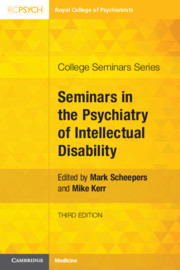Book contents
- Seminars in the Psychiatry of Intellectual Disability
- College Seminars Series
- Seminars in the Psychiatry of Intellectual Disability
- Copyright page
- Contents
- Contributors
- Section 1 Understanding Intellectual Disability
- Section 2 Co-morbidity
- Section 3 Psychiatric and Behavioural Disorders
- Section 4 Delivering High-Quality Care
- Chapter 16 History of Services for People with Disorders of Intellectual Development
- Chapter 17 Inpatient Care for People with Intellectual Disability
- Chapter 18 Legal Provisions and Restrictive Practices
- Chapter 19 Leadership and Management
- Chapter 20 Clinical Research in Intellectual Disabilities
- Chapter 21 Training in Intellectual Disability Psychiatry
- Index
- References
Chapter 17 - Inpatient Care for People with Intellectual Disability
from Section 4 - Delivering High-Quality Care
Published online by Cambridge University Press: 14 January 2019
- Seminars in the Psychiatry of Intellectual Disability
- College Seminars Series
- Seminars in the Psychiatry of Intellectual Disability
- Copyright page
- Contents
- Contributors
- Section 1 Understanding Intellectual Disability
- Section 2 Co-morbidity
- Section 3 Psychiatric and Behavioural Disorders
- Section 4 Delivering High-Quality Care
- Chapter 16 History of Services for People with Disorders of Intellectual Development
- Chapter 17 Inpatient Care for People with Intellectual Disability
- Chapter 18 Legal Provisions and Restrictive Practices
- Chapter 19 Leadership and Management
- Chapter 20 Clinical Research in Intellectual Disabilities
- Chapter 21 Training in Intellectual Disability Psychiatry
- Index
- References
- Type
- Chapter
- Information
- Seminars in the Psychiatry of Intellectual Disability , pp. 204 - 212Publisher: Cambridge University PressPrint publication year: 2019



